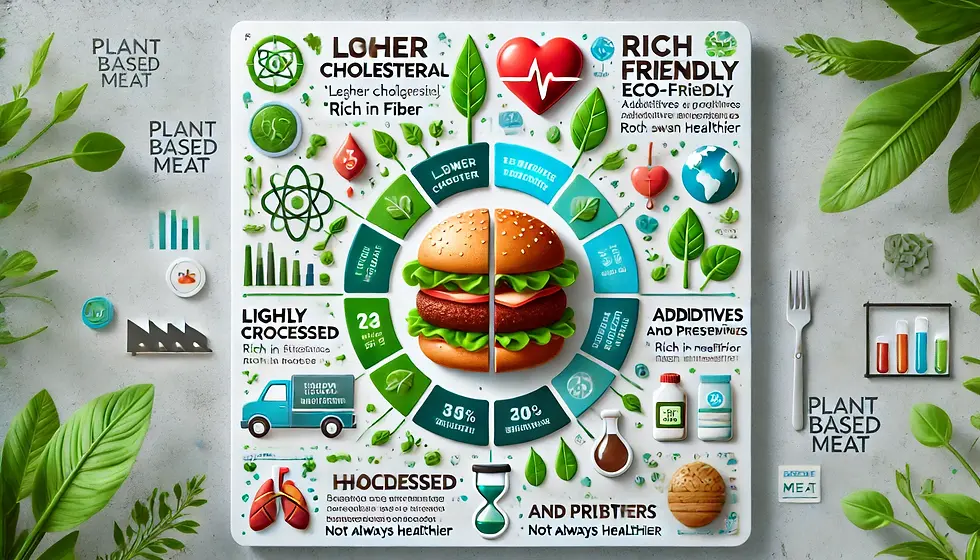Is Plant-Based Meat Healthy? Pros and Cons Backed by Science
- Kautilya Upadhyay
- Feb 25
- 3 min read
Updated: Mar 8
Plant-based meats like Beyond Burger and Impossible Chicken are booming, promising the taste of real meat without the environmental or ethical downsides. But are they actually healthy? Let’s dive into the science, compare them to traditional meat, and uncover the pros and cons—no jargon, just facts!

What Is Plant-Based Meat?
Plant-based meat mimics the flavor and texture of animal meat using ingredients like:
Proteins: Pea, soy, or wheat gluten.
Fats: Coconut oil, sunflower oil.
Binders: Beet juice (for “blood”), methylcellulose.
Vitamins: Added B12, iron, zinc.
Popular brands include Beyond Meat, Impossible Foods, and Gardein.
Pros of Plant-Based Meat (Backed by Science)
1. Lower in Saturated Fat
Science Says: Animal meats (especially red meat) are high in saturated fats, which can raise LDL (“bad”) cholesterol and heart disease risk.
Plant-Based Perk: Most alternatives use coconut or vegetable oils, which have less saturated fat.
Example: Beyond Burger has 6g saturated fat vs. 9g in a beef burger.
2. Zero Cholesterol
Science Says: Cholesterol is only found in animal products. Plant-based meats are cholesterol-free, supporting heart health.
3. Contains Fiber
Science Says: Animal meat has no fiber. Plant-based options often include 2–4g per serving, aiding digestion and gut health.
4. Better for the Environment
Science Says: Producing plant-based meat generates 90% fewer greenhouse gases than beef.
5. No Antibiotics or Hormones
Science Says: Plant-based meats avoid the antibiotics linked to antibiotic resistance in animal farming.
Cons of Plant-Based Meat (What to Watch For)
1. High in Sodium
Science Says: Many plant-based meats are loaded with salt for flavor.
Example: Impossible Sausage has 580mg sodium per link (25% of daily limit).
Risk: Excess sodium can raise blood pressure.
2. Highly Processed Ingredients
Science Says: Some products contain additives like methylcellulose (a thickener) or artificial flavors.
Risk: Long-term effects of ultra-processed foods are still being studied, but they’re linked to inflammation.
3. Lower Protein Than Animal Meat
Science Says: While close, plant-based meats often have slightly less protein.
Example: Beyond Burger = 20g protein vs. beef burger = 25g.
4. Allergen Risks
Science Says: Many contain soy or gluten, common allergens.
Plant-Based Meat vs. Whole Plant Proteins
While plant-based meats are convenient, whole foods like lentils, beans, and tofu are:
Less processed.
Cheaper.
Higher in fiber and nutrients.
Bottom line: Use plant-based meats as an occasional swap for burgers or meatballs, not a daily staple.
How to Choose a Healthy Plant-Based Meat
Check Sodium: Aim for ≤300mg per serving.
Prioritize Protein: Look for at least 15g per serving.
Avoid Artificial Additives: Choose brands with simple ingredient lists (e.g., pea protein, beet powder).
Non-GMO & Organic: Brands like Dr. Praeger’s or Hilary’s use cleaner ingredients.
Plant-Based Meat vs. Animal Meat: Quick Comparison
Factor | Plant-Based Meat | Animal Meat |
Saturated Fat | Lower | Higher |
Cholesterol | 0mg | High (e.g., 80mg in beef) |
Fiber | Yes (2–4g) | No |
Processing | Often ultra-processed | Minimally processed |
Environmental Impact | Low | High |
The Verdict
Plant-based meat is a healthier choice compared to red meat—it’s lower in saturated fat, cholesterol-free, and eco-friendly. However, it’s not a “health food” due to processing and sodium. Use it as a transition tool if you’re reducing meat, but prioritize whole plant proteins like beans and lentils for everyday meals.
FAQs
Q: Is plant-based meat good for weight loss?
A: It can be, if it’s lower in calories than animal meat. Check labels—some are just as calorie-dense!
Q: Can kids eat plant-based meat?
A: Yes, but opt for low-sodium options and pair with whole foods for balanced nutrition.
Q: Does plant-based meat cause bloating?
A: Some people experience gas from pea protein or additives. Start with small portions.
Q: Is it better for the planet than real meat?
A: Yes! It uses less water, land, and energy compared to beef.

Commentaires